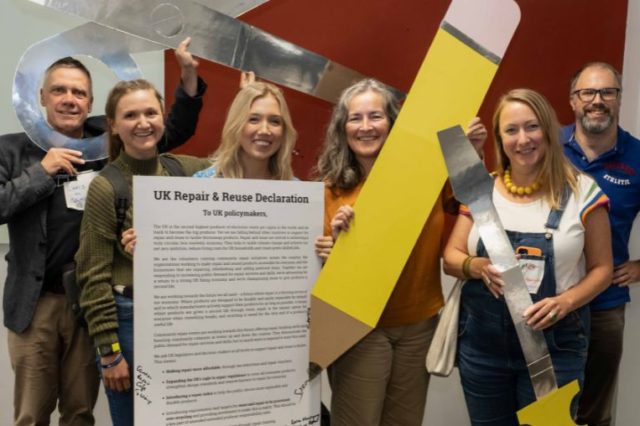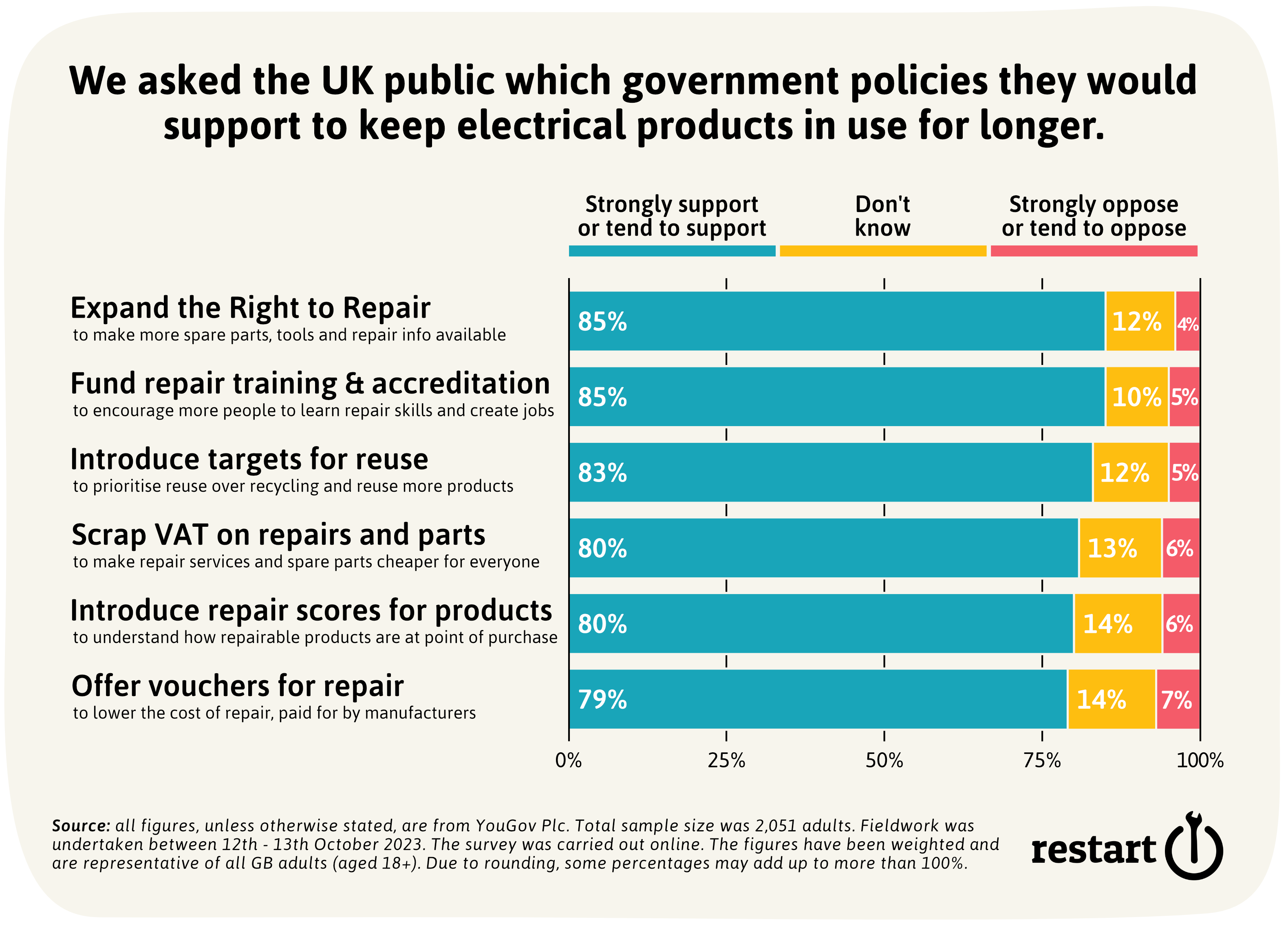
Why it’s important and what others are doing
Repair and reuse are affordable and easy ways to end frustration with in-built obsolescence. They’re central to achieving a truly circular, less wasteful, and resilient economy, help to tackle climate change and achieve our net zero ambition. And they can reduce living costs for UK households and create skilled green jobs.
With the Repair and Reuse Declaration, we’re asking UK legislators and decision-makers at all levels to support repair and reuse to thrive, including:
1. Make repair more affordable, through tax reductions and repair vouchers
Repair vouchers: Austria set up a national repair voucher scheme in 2022, which effectively subsidised the cost of professional repairs by allowing families to obtain a rebate of 50% of the price of a repair, up to €200 per year. A previous Upper Austrian trial, found that 40% of the beneficiaries wouldn’t have chosen repair without the voucher scheme.
France has since initiated an innovative repair voucher scheme in 2023, funded by Extended Producer Responsibility (EPR) income. This route to financing the scheme could be applicable to the UK, as it effectively uses part of the existing contributions from manufacturers to extend the lifetime of products and prevent products from prematurely entering the e-waste stream.
Cutting VAT on repairs: A recent study by Green Alliance showed 54% of people surveyed in the UK support green VAT measures like this. Only 12% oppose. And it could contribute to creating 34,000 jobs in the repair economy.
A number of businesses, from spare parts providers (Replace Base) to manufacturers are currently calling for the UK government to remove VAT on spare parts and repair services to reduce the cost of repair. Sign the Replace Base petition here.
More information: You can hear more about other financial incentives for repair from the European Right to Repair.
2. Make repair easier: Expand the UK’s right to repair regulations to cover all consumer products, strengthen design standards and remove barriers to repair for everyone.
The UK has existing ecodesign legislation, some of which covers resource efficiency and repair for a limited set of products including white goods and TVs. They mandate that manufacturers must make service manuals and some spare parts for these products available to professional repairers for 7 to 10 years after retiring a product from the market. Now it’s time to expand this “right to repair” legislation so that it’s fit for purpose in our rapidly changing consumer goods economy. This means:
- Expand and strengthen Ecodesign regulation to cover all electronic and consumer products, ensuring that all new consumer electricals must be designed for easy reparability before they can be introduced to the market.
- Ensure that all people have access to service manuals, so consumers, community repair groups and independent repairers have the information they need to fix these products. And ensure all people can access spare parts for at least 10 years after a product is removed from the market.
- Ensure that software and security updates are provided for at least 5 years after a product comes off the market.For phones, laptops and, increasingly other products like smart fridges that are connected to the internet, ongoing security updates are needed to protect households from hacking risks. Ongoing software support is needed to keep the products functioning as they should.Too often, this software and security support ends within a few years, far before the useful lifetime of the product ends. This means too many products become obsolete too early, which increases electronic waste – or puts consumers at risk. There are currently no UK requirements for minimum support periods.After a recent successful campaign in the USA led by the brilliant PIRG, Google extended its support for Chromebooks, widely used in schools, to 10 years, for all models released since 2021. Doubling the life of Chromebooks could cut carbon pollution equivalent to taking 900,000 cars off the road for a year and result in $1.8 billion in savings for schools in the US.
The EU has recently expanded its ecodesign regulations to cover smartphones and tablets, mandating that from June 2025 manufacturers will have to make software and security updates available for new models for at least 5 years after removing a product from the market, as well as making spare parts and repair information available for at least 7 years.
3. Introduce a repair index to help the public choose more repairable and durable products
UK consumers aren’t able to easily find out how repairable products are when purchasing new items. This means they buy products that they have to replace sooner than they’d like, and there’s little incentive for manufacturers to make products repairable.
A repair index has been in place in France since 2021. This is similar to the existing eco rating we have for energy use on appliances now, but based on how easy it is to repair each product. For this, manufacturers self-assess the repairability of their products based on agreed criteria. This is then displayed as a single score from 0-10, displayed prominently alongside the price.
Analysis of the french repair index after the first year showed that:
- 55% of people were aware of the index
- 76% of those aware, said it was useful for their purchase
- Consumers tended to prefer products with a higher repairability score.
- This consumer shift, alongside upcoming EU legislation has resulted in companies improving the repairability of their products
We need a repair index in the UK so that consumers can make informed choices about the products they buy.
4. Save reusable products from being wasted: Introduce requirements and targets for reuse and repair to be prioritised over recycling, and provide investment to make this a reality. This should be a key part of amended Extended Producer Responsibility rules.
In our recent study of small appliances taken to a Household Reuse and Recycling Centre, we found that almost half of the electrical products sent for recycling during the study could have remained in use if reuse and repair processes had been in place:
- 36% of all small electricals headed for recycling were still working.
- An additional 10% of items assessed only needed simple, low cost repairs.
- It was estimated that across the UK this could mean that over 30,000 usable electrical products, with a potential resale value of up to £5,000 are being recycled every week.
Although recycling targets and the current Extended Producer Responsibility (EPR) requirements include reuse, they inadvertently dissuade manufacturers and local authorities from investing in redistributing reusable items. With a far more established value chain, the emphasis has been on the challenge of meeting recycling targets.
The solution: An overhaul of the current EPR rules is needed to drive the establishment of local and national infrastructure to keep products in use for longer, saving people money and using our resources more efficiently. This should include separate reuse targets, prioritised over recycling and additional targets for overall waste reduction. EPR could also be better used to drive improvements in product design and could help fund initiatives to support reuse and repair such as repair vouchers (mentioned above).
5. Support a new generation of repairers through repair training, accreditation and apprenticeships.
The Chartered Institution for Wastes Management estimates that for the transition to a circular economy, 20,000 repair and reuse jobs will be needed by 2030, with 80,000+ needed by 2040. Green Alliance estimates that an effective and expanded circular economy could help create over 450,000 jobs by 2035. Upstream, there is significant demand for designers who can create repairable products.
Repair cafes are frequently oversubscribed, with public demand for repair far outstripping fixing capacity at the volunteer-run events. Yet as public demand for repair and preloved products, and as the need for competent and safe repair of our appliances increases, we are losing skilled repairers. Even where jobs are guaranteed by manufacturers offering repair services, recruitment of new repairers is challenging.
This is having a knock on effect: Courses for repair technicians are dwindling due to reduced demand and there are currently no accreditation options available for electrical repair training. So there are few options, and fewer incentives, for those that want to learn repair skills.
The solution: Alongside the measures needed to build demand and infrastructure for a strong repair and reuse economy outlined above, we need investment in repair skills to drive the economy. This means introducing an accreditation scheme for repair professionals, funding specific skills interventions like Skills Bootcamps on repair and green design, building repair apprenticeship options and including repair into existing engineering and design apprenticeships.
All of the policies above enjoy overwhelming public support. A YouGov poll commissioned for the declaration launch showed that between 79% and 85% of the general public strongly support or tend to support every measure (see note 1 for survey details).

The move to our throwaway economy has been a slow creep, and the measures needed to give reuse and repair a boost are numerous and complex. There are many more options for stimulating repair and reuse, but these policies are a start in the shift towards a truly circular economy.
__
Please find here a more detailed policy briefing to share with your MP.
Note 1: The poll was commissioned by The Restart Project. All figures are from YouGov Plc. Total sample size was 2,051 adults. Fieldwork was undertaken between 12th – 13th October 2023. The survey was carried out online. The figures have been weighted and are representative of all GB adults (aged 18+).
(Photo by Mark A Phillips, licensed under CC BY-NC-SA 4.0)
Absolutely agree! Making repairs more affordable is a crucial step towards fostering a sustainable and consumer-friendly tech environment. Implementing tax reductions and repair vouchers could go a long way in empowering consumers and promoting a circular economy. It’s time to prioritize accessibility to affordable repairs and reduce electronic waste. Hope this suggestion gains traction for the benefit of both consumers and the environment.